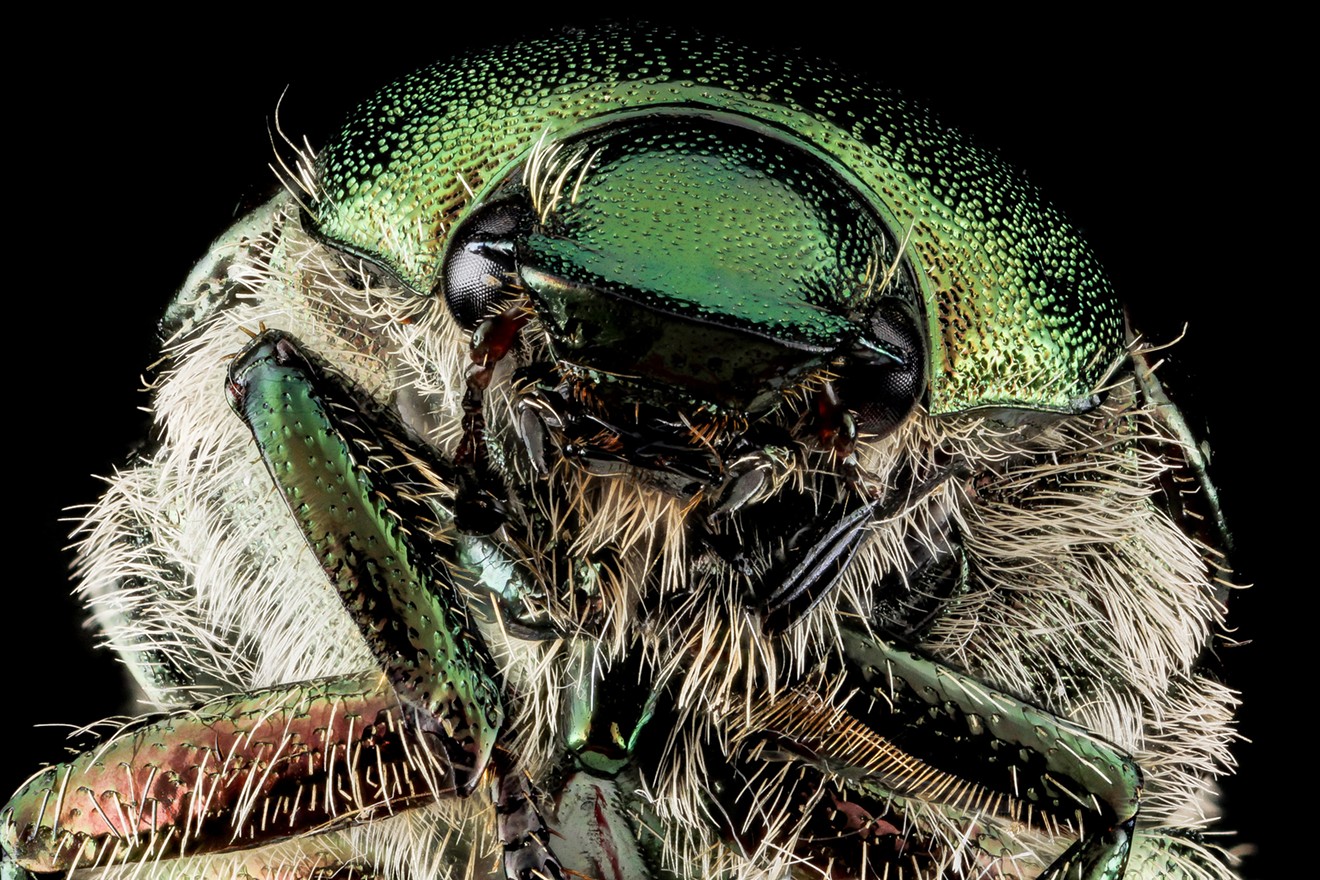Goodbye, grapevines. Au revoir, roses. Bon voyage, Virginia creeper. It’s been great having you in the garden, but the Japanese beetles are hungry, and they can hear the green thumbs of Denver ringing the dinner bell.
Since 2006, Denver has seen the invasive Japanese beetles popping up in yards all over town, chewing away at our plants. The options for fighting them are few. There are traps, but experts say that unless they’re in every yard in town, they'll just draw more of the pests directly to you. You could brush them off the trees by hand, dropping them into a soapy bucket, but that’s both work-intensive and of dubious long-term effect. You can use pesticides, but those tend to work mainly on the grubs; by the time you see the full-grown bugs, you have a full-grown problem.
So what is a Denverite to do? CSU extension has some ideas, but we’d like to offer some alternatives to the usual advice.

A rose by any other name would taste as sweet.
Shelby L. Bell at Flickr
As counter-intuitive as it might seem, this is actually a suggestion from some of the experts. It makes sense: If Japanese beetles prefer certain plants, you avoid planting those plants. And if you have those plants, you get rid of them in favor of non-beetle-attracting plants. Is this an extreme measure? Yes, yes, it is. But it could be worse.

Put some plastic tulips by the front stoop so you don't get super-depressed.
Jeff Covey at Flickr
This isn’t about reduction in water usage, as noble and Southwesterny as that may be. Zeroscape. As in, take it all out. You have some options here, of course. You could just go back to the dirt. You could lay out AstroTurf. You could let everything die and then paint it green so it looks (sort of) like it’s still alive. Would Japanese beetles munch on zombie plant flesh? Nope. So go ahead: Take it all out with a flamethrower. There is nothing inherently wrong with a literal scorched-earth policy when it comes to gardening. In order to save the yard, it may be necessary to destroy the yard.

If you let the roses go, that will be the end of it, but if you don't, I will look for you, I will find you, and I will kill you.
Heather Smithers at Flickr
Starlings (along with grackles, crow, robins and sparrows, to name only a few) are the natural predators of the Japanese beetle. Starlings are just the best at it because they dine not only on the adult beetles, but also on the grubs that grow in the grass and emerge to start wreaking havoc. True, starlings aren’t the prettiest of birds, and they can actually drive away birds of a more pleasant hue — bluebirds, for example. And they’re trash-lovers and can make a real mess. But they’re also the monster under the bed in the Japanese beetle world, and putting together a small army of them — officially termed a murmuration of starlings — will strike fear into the craven hearts of the insect invaders. And maybe your neighbors, too. Hopefully some avian muscle will teach Carl to return your weed wacker promptly next time.
4. Live inside a giant wall of netting.
In Trump’s America, isolationism seems to be the way of things these days, so why not apply national policy to your very own quarter-acre piece of heaven? And if you really want the 2018 presidential experience, you can plan to build a giant net and make the Japanese beetles pay for it. It won’t happen, of course, but just repeating the lie over and over again will make you feel so much more powerful.
3. Diplomacy
But maybe isolation politics isn’t for you, so go the other direction. You’ve tried pesticides, you’ve tried brushing them gently off the vines and into a soap bath, you’ve tried measures both aggressive and extreme. Still, they threaten. Invite the beetles to a summit, where you can ceremonially hash out the particulars. You'll start out by agreeing to ban chemical warfare. Maybe you'll agree to surrender a rose bush if they leave the grapes alone. Or maybe you'll put out a single plant still in a container where they can feast to their heart’s content — a sacrifice like Andromeda to the Kraken from Clash of the Titans, only there’s no severed Medusa head to save the day. Is sacrifice the same thing as diplomacy? Mythically speaking, sure.

Hey, do you have any Cholula you could set out on the porch? Thaaaaanks.
coniferconifer at Flickr
If you can’t beat ’em, appreciate them. Look at it this way: When you own a snake, you also keep mice to feed to the snake. But you don’t consider the mice pets, because that would be sad. So switch up your perspective. You’re planting Japanese beetle food. “Ah, look, dear,” you might say, leaning back in your porch swing one Denver summer evening. “Don’t the Beetles look happy tonight?” Life is good, only if you define “good” as everything that's going to happen anyway.
1. Submit
Because just like Joan Collins and Kent Brockman, you, for one, can welcome our new insect overlords.












